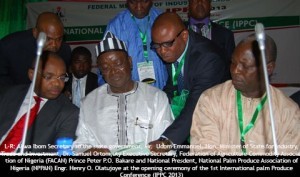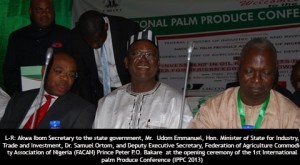President Goodluck Jonathan has declared open the 1st International Palm Produce Conference (IPPC) in Uyo, Akwa Ibom State with a call on stakeholders in the sector to explore available investment opportunities in the palm produce industry in Nigeria.
The 3-Day conference which was jointly organized by the Federal Ministry of Industry, Trade and Investment and the Federal Ministry of Agriculture and Rural Development in collaboration with the National Palm Produce Association of Nigeria (NPPAN) has as its theme: “Investment in Oil Palm and Its Derivatives – A Panacea for Economic Growth and Sustenance.”
 In his address read by the Minister of State for Industry, Trade and Investment, Samuel Ortom, President Jonathan pointed out that the aim of the landmark conference was to bring together global stakeholders to share ideas on new technological development and ways of improving the quality and availability of palm produce. This, he said is to maximize the growing investment opportunities in both domestic and international palm produce trade as well as to utilize the investment-friendly climate and the incentives put in place by the present administration.
In his address read by the Minister of State for Industry, Trade and Investment, Samuel Ortom, President Jonathan pointed out that the aim of the landmark conference was to bring together global stakeholders to share ideas on new technological development and ways of improving the quality and availability of palm produce. This, he said is to maximize the growing investment opportunities in both domestic and international palm produce trade as well as to utilize the investment-friendly climate and the incentives put in place by the present administration.
He expressed satisfaction with the timing of the conference, saying it held at a time when the government has established the necessary policies towards creating the enabling environments and frameworks for sustainable businesses and economic growth in agricultural produce such as oil palm in which the country has significant comparative advantage.
“As one of our cardinal goals under the Transformation Agenda, we are unrelenting in our effort to explore and unlock the enormous potentials of our agriculture. We are doing this through the rapid transformation of key agriculture value – chains, in order to meet the objective of adding additional 20 million metric tonnes of food to the domestic supply by 2015,’ he said.
President Jonathan identified the stimulus for the creation of over 3.5 million jobs along the agriculture value – chains; noting that his government has recognized oil palm as one of the important commodities and key drivers to promote and has intensified efforts to provide enabling environments for accomplishing this task.
In the address, the President pointed out that Nigeria is an oil palm producing nation and was a foremost producer and exporter especially in the fifties and sixties when the nation dominated the palm produce industry and became world largest producer and marketer between 1961 and 1965. He added that the country as at then contributed an average world production share of 39 percent. He however, regretted that the Government allowed this position to slip away from the country.
He also spoke on his administration’s resolve to return to the former glorious level of performance as part of Government’s commitment to sustainable expansion in the area of cultivation, the replacement of semi-wild grooves with improved tenera planting material and upgrading of the quality and number of palm oil mills as well as vegetable oil refineries in the country and expansion of domestic and international market outreach.
President Jonathan commended the Government and people of Akwa Ibom State and other Governors of Palm Oil Producing States; government agencies, corporate bodies and international partners for their contributions to the successful hosting of the conference.
In his remarks at the occasion, the Minister of Agriculture and Rural Development, Akinwumi Adesina represented by Dickson Okolo said that the administration of President Goodluck Jonathan has recorded several giant strides from 2011 which has re-versed Nigerian records and turned the fortunes of the palm produce industry in the country around. This, according to him has been done through improvement in the supply of planting materials and efforts to support the production of nine million improved tenera sprouted nuts by the Nigerian Institute for Oil Palm Research which are being raised into mature seedlings and distributed to smallholder farmers in twenty four states.
He added that his Ministry will distribute 73 No. motorized harvesters at subsidised and affordable rates, each of which is capable of harvesting 500-900 fresh fruit bunches per day. “We are currently fabricating better mills for small and medium – scale plantations to be made available soon to farmers and processors to support the now expanding scope of fresh fruit bunch harvest,” he explained.
In his address, the Governor of Akwa Ibom State, Godwills Akpabio represented by the Secretary to the State Government, Udom Emmanuel said that investment in oil palm production would not only restore Nigeria’s pride and glory but boast the economy and create jobs for teeming youths and in turn help in reducing unemployment figures.
He added that the State has created enabling environments for investors and invested heavily in oil palm production through assistance to oil palm producing plantations across the State; the provision of improved seedlings to farmers as well as soft loans and grants to women under the scheme known as: “Our Women in Agriculture Development Programme.”
In his contribution at the occasion, the Governor of Kogi State, Idris Wada represented by the Commissioner for Commerce and Industry, Ali Ajuh said that oil palm is a very valuable commercial asset of the State; indicating that his administration has invested in oil plantations in various locations across the State with a view to increasing productivity and attracting potential investors.
“Kogi State has an open door policy as well as investor-friendly strategies for welcoming serious individuals and organizations from all over the world to invest in the oil palm industry under the Public Private-Partnership (PPP) arrangement,” Wada said.
In his welcome address, the Minister of State for Industry, Trade and Investment, Samuel Ortom stated that within the framework of the Transformation Agenda, the Ministry of Industry, Trade and Investment has commenced the process of revitalising the industrial sector through the National Industrial Revolution Plan (NIRP). The plan, he revealed was designed to position the manufacturing sub-sector as a major contributor to the Gross Domestic Product (GDP). He also informed that palm processing has been identified in the plan as a key component of the contribution from the agro-processing sub-sector.
According to him, the outcome of the conference will provide Nigeria and other palm producing regions the needed framework and working tool to enable the attainment of full potentials in the production and processing of the commodity.
Support InfoStride News' Credible Journalism: Only credible journalism can guarantee a fair, accountable and transparent society, including democracy and government. It involves a lot of efforts and money. We need your support. Click here to Donate
